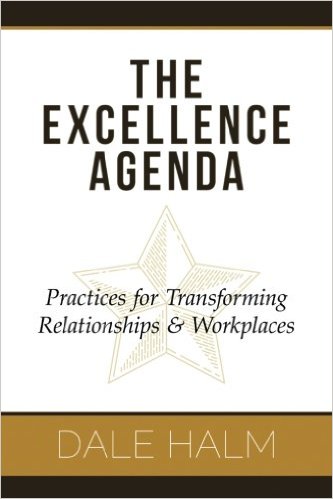Excellence Agenda
Practices for Transforming Relationships & Workplaces
Are you creating excellence in your relationships, in your workplace? This book will forever change how you approach working with others. In The Excellence Agenda, Dale Halm author and renowned business consultant, explores what it takes to truly excel. It reveals the mindset and behaviors needed for optimal performance. By offering a series of thought-provoking questions, this book provides a powerful roadmap for success. It includes:
- The Success Paradigm – alternative ways of thinking that foster collaboration
- Breakthrough Practices – crucial behaviors that lead to exceptional results
- Tools – guidelines for mastering the skills of excellence
- Excellence Survey – 20 questions to help you assess your ability to excel
The Excellence Agenda will inspire you to transform your relationships and workplace.
Featured Posts
June 18, 2022 | Dale Halm
Paradigm Power
The focus of most organizations and interactions is on what we did, are doing, or going to do. The organizations I have worked for almost always value doing over thinking. What actions need to be taken? Who is doing what? The mindset is: work faster, never say no, and keep doing more. If we could just do more, things would be better.
In meetings, it's amazing how everyone’s attention immediately focuses on human doing. Human doing is our relentless focus on the task. What do we need to do more of? What outcomes are we trying to accomplish? People simply don't pay much attention to the "thinking" they bring to the meeting. This can limit their productivity as most individuals are fixated on the content of the meeting. The content represents things that can be observed such as who says what, the material or topics being presented, the data and information being reviewed, or even the seating arrangement.
On the other hand, the context of the meeting is represented by the circumstances that have brought people together and the thinking each person brings into the room. This is the cognitive framework or way of viewing reality that is being applied. Ultimately, the paradigms we use determine what's possible.
To realize organizational excellence, you define and act on a paradigm that enables you to work with others in exceptional ways. Think of a paradigm as a rule book for thinking. When people struggle to achieve excellence, it inevitably can be attributed to their paradigm. Excellence is about shifting your thinking so you can be more effective when relating to others and dealing with life's challenges.
Typically, when people strive to improve things, but are unable to make progress, they try harder. They do more. A better approach is to first assess and adapt your thinking, and then adjust your behavior accordingly. This is thinking about your thinking. We don’t often do that. Unfortunately, we often limit ourselves due to fixed viewpoints and either or thinking. This is why it is so vital to be aware of your paradigm when striving for excellence.
You need a way of thinking that unlocks your conventional thought process and can offer you new insights. Try embracing the paradigm below.
These four mindsets can alter your experience.
- Be Open-Minded
This is your ability to consider other people's ideas. It is being curious, receptive, and removing your personal biases and prejudices. This doesn’t mean agreeing or changing who you are. It means being sincerely interested in other viewpoints and considering various options. - Questions, Not Answers
This perspective suggests that questions are actually more powerful and thought-provoking than answers. Questions allow us to reflect and consider another course of action instead of responding with answers which simply reinforce our opinion. - Willingness to Be Vulnerable
The inclination to always "look good" is a common tactic used for how we interact with others. The unspoken rule is that making errors or appearing weak, especially in front of others, should be avoided at all cost. Surprisingly, when people express genuine vulnerability is when we are most drawn to them. When you open yourself up to being real, ask for help or share heartfelt ideas, you can improve your relationships. To be bold, be vulnerable. - Stop Thinking You’re Right
Of course it's "OK" to be right, but it is self-destructive when you insist that you're right. This can become a mind trap that provokes defensiveness. It can also lead to exerting control over others.
Now, ask yourself, what difference would it make if you practiced this paradigm regularly? How could it help you achieve a new level of excellence?

